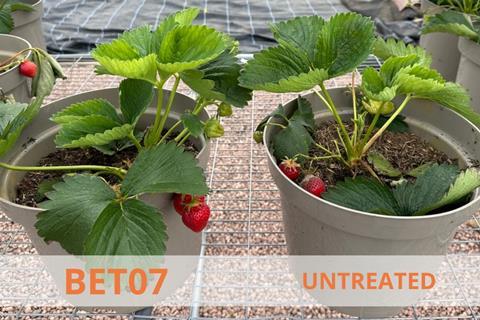BET07 will apply to a range of horticultural crops, with registration expected in the autumn

Crop protection manufacturer UPL is expecting to receive registration for a new residue and harvest-interval-free disease control option in the autumn.
The registration for BET07 will apply to topfruit, soft fruit, vines, beans and protected leafy salads to control a range of diseases, including powdery mildew, downy mildew, botrytis and scab.
BET07 controls disease by stimulating the plant’s natural defences. Its active ingredient is laminarin, which has become an established and increasingly popular plant health elicitor in cereal crops, marketed under the brand name Iodus, according to Stuart Jackson, head of technical services for UPL.
“Laminarin mimics the degraded cellular material released from a fungal attack,” Jackson explained. “Multiple biochemical pathways are activated, which stimulate nearby cells’ defence systems. Applying laminarin before a fungal pathogen attacks the plant prepares it for when an actual infection occurs.
“It delivers a quick and intense response lasting 7-10 days in perennial crops.”
UPL trials have shown that BET07 achieves similar levels of disease control to conventional fungicides and biofungicides on key diseases, including apple scab, powdery mildew, and botrytis. When combined with conventional fungicides, it provides a further boost to disease control and marketable yield, Jackson said.
Some of the key benefits of BET07 are its flexibility of use, he continued. Once approved, it’s expected that the label will have no harvest interval, and UPL has found it has an excellent beneficial profile. The company also expects it to receive organic certification.
“BET70 is a new way of looking at disease control,” Jackson added. “It stimulates the plant to fight off disease rather than affecting the pathogen itself. The benefits of this approach will quickly become apparent to growers: at least the same levels of disease control they’re used to, but with much more flexibility on application timing and harvest.”



